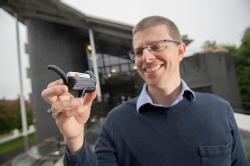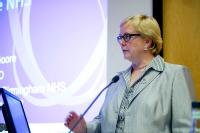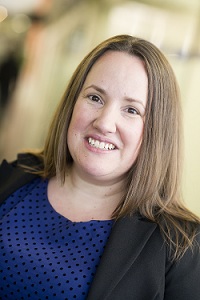WMG News
New pelvis motion tracking technology to transform hip replacement decisions
A new pelvis motion tracking device developed by WMG, at the University of Warwick, can help detect flexible pelvises without numerous x-rays, to determine who will benefit from more advanced surgical planning before hip replacement surgery.
 Researchers at WMG’s Institute of Digital Healthcare and Professor Richard King, of University Hospital Coventry and Warwickshire - and Honorary Professor at Warwick Medical School, have developed a small device that can be put at the bottom of your back to scan the movement of your pelvis prior to a hip replacement.
Researchers at WMG’s Institute of Digital Healthcare and Professor Richard King, of University Hospital Coventry and Warwickshire - and Honorary Professor at Warwick Medical School, have developed a small device that can be put at the bottom of your back to scan the movement of your pelvis prior to a hip replacement.
Using e-health to support the challenges of an ageing population
Researchers at our Institute of Digital Healthcare have published a systematic review on e-health based active ageing interventions.
As life expectancy is at an all-time high, this type of research has become an international priority offering enormous potential to support individuals, communities, clinicians and policy makers.
Our Professor of e-Health Innovation and Head of Research, Theo Arvanitis, Dr Timothy Robbins and Dr Sarah Lim Choi Keung, worked alongside experts at University Hospitals Coventry and Warwickshire to establish the extent to which current research literature considers e-health-based and telemedicine-based active ageing interventions.
WMG research helps expand Sweatcoin capabilities
Researchers at our Institute of Digital Healthcare (IDH) have been working, with the health and fitness app Sweatcoin, to develop a new verification process that will now allow indoor steps to be tracked for the first time.
Sweatcoin monitors steps throughout the day, via an app downloaded to a smartphone. Users are rewarded with one Sweatcoin (SWC) per every 1,000 steps. The digital currency can then be redeemed for items including magazines, clothing, music downloads and even televisions.
Previously the app was only capable of tracking outdoor steps - a big disadvantage for those with active jobs indoors or even those using the gym.
The 12-month project, funded by Innovate UK, collected large amounts of data from the sensors built into smartphones in parallel with step-count data recorded using high accuracy activity monitors. Researchers on the project then used this data to create a new step-verification model to work in any environment, not just outdoors.
One of UK’s foremost NHS chief executives to lead Healthcare Systems activities at WMG
 It was announced today, Thursday 26th April 2018, that Dame Julie Moore, currently Chief Executive of University Hospitals Birmingham NHS Foundation Trust (UHB), is to become a Professor of Healthcare Systems at WMG, University of Warwick. Her new role will see her leading on a range of both research and education projects, leading collaborations with the NHS and other healthcare providers.
It was announced today, Thursday 26th April 2018, that Dame Julie Moore, currently Chief Executive of University Hospitals Birmingham NHS Foundation Trust (UHB), is to become a Professor of Healthcare Systems at WMG, University of Warwick. Her new role will see her leading on a range of both research and education projects, leading collaborations with the NHS and other healthcare providers.
Dame Julie has held the position of Honorary Professor, at WMG, since 2013. In that time she has delivered three thought provoking and informative special lectures covering topics such as ‘Is the NHS Succeeding or Failing?’
Professor Stuart Croft, Vice Chancellor of the University of Warwick said
“This is a stellar appointment. Nursing Times has described Dame Julie one of the best leaders in the NHS, and Radio 4’s Woman’s Hour has named her as one of the 100 most powerful women in the UK. I have no doubt that her new research role here with us in WMG at the University of Warwick will result in transformative research that will help enhance the delivery of healthcare across the UK.”
Healthcare technology conference hosted by the Institute of Digital Healthcare
On Thursday 3rd May 2018, the Institute of Digital Healthcare (IDH) at WMG, University of Warwick, will be hosting the Digital Health & Care and Safety of Connected Health: Improvements & Applications Conference (DICOH’18).
The national conference is being sponsored by the West Midlands Academic Health Science Network and NHS Digital.
Professor Maureen Baker CBE, Chair of the Professional Record Standards Body, Dr Cian Hughes Senior Research Scientist, DeepMind and Professor Theo  Arvanitis, Chair in e-Health Innovation and Head of Research at WMG will be joining other key experts in digital healthcare speaking at the conference.
Arvanitis, Chair in e-Health Innovation and Head of Research at WMG will be joining other key experts in digital healthcare speaking at the conference.
There will also be a tutorial on clinical IT safety organised jointly by the Institute of Digital Health and the NHS Digital.
You can get more information or register for DICOH’18 here.
WMG Assistant Professors support EPSRC in ‘Manufacturing the Future’
Dr John Low and Dr Jerome Charmet have been appointed as members of EPSRC’s prestigious Early Career Forum in Manufacturing Research.
They will be tasked with establishing a community of early career academics to provide Theme Leaders at EPSRC with strategic advice to develop their themes in ‘Manufacturing the Future’. They will also act as a conduit for communication (with EPSRC), covering the broader community in manufacturing research both nationally and internationally.
 Dr John Low who works in WMG’s Energy Innovation Centre, explains: “I will share my vision of manufacturing science in energy storage to help accelerate the UK’s advances in fundamental electrochemistry through to application-driven programmes.”
Dr John Low who works in WMG’s Energy Innovation Centre, explains: “I will share my vision of manufacturing science in energy storage to help accelerate the UK’s advances in fundamental electrochemistry through to application-driven programmes.”
Dr Jerome Charmet, who is based within the Institute of Digital Healthcare team said: “I will endeavour to bridge the gap between the  biomedical/clinical sciences and the manufacturing communities, in particular in the area of micro and nanotechnologies.”
biomedical/clinical sciences and the manufacturing communities, in particular in the area of micro and nanotechnologies.”
WMG part of £30 million funding to help transform health through data science
 WMG, at the University of Warwick, is a key partner in the Midlands site helping to deliver a £30 million project by Health Data Research UK, to address challenging UK healthcare issues using data science, which is looking at making game-changing improvements in people’s health by harnessing data science at scale across the UK.
WMG, at the University of Warwick, is a key partner in the Midlands site helping to deliver a £30 million project by Health Data Research UK, to address challenging UK healthcare issues using data science, which is looking at making game-changing improvements in people’s health by harnessing data science at scale across the UK.
WMG will be part of the “Midlands HDR UK Substantive Site”, which will tackle the challenge of how to make NHS data more useable and accessible for research; and will develop, evaluate and apply appropriate analytical tools to NHS data in real time in order to inform decision making and improve health for both the patient and population. The Institute of Digital Healthcare (IDH), WMG will lead the Warwick part of the programme, together with colleagues from Warwick Medical School and Warwick’s Mathematics Institute.
Pregnancy loss biobank to receive £1.2million in funding
Research to help identify women at risk of pregnancy complications is to receive a huge financial boost.
The Medical Research Council (MRC) is to give The Tommy's Reproductive Health Biobank a grant of £1.2million.
The biobank will be the most significant collection of reproductive health tissues in the UK. Operating on a virtual basis with its server based at University Hospitals Coventry and Warwickshire NHS Trust (UHCW) and will begin operating on 29 September. It will store biological samples collected by scientists and clinicians at UHCW, the University of Warwick, University of Birmingham, Imperial College, Kings College London, University of Edinburgh and University of Manchester. The tissues, donated by women who have a history of pregnancy problems, and clinical data will help scientists find new causes and cures for miscarriage, stillbirth, and premature birth.
People are reluctant to use public defibrillators to treat cardiac arrests
A study led the University of Warwick suggests that people are reluctant to use public access defibrillators to treat cardiac arrests.
The analysis of existing international studies, which has been published in the European Heart Journal – Quality of Care and Clinical Outcomes, suggests that there are a number of factors that prevent members of the public from using them and potentially saving lives.
The researchers’ study suggests that many members of the public don’t know what an automated external defibrillator (AED) is, where to find one and how to use one. This is despite AEDs being suitable for use by untrained members of the public. Although studies suggest there is variation across the studies they analysed in the number of people willing to use an AED a lack of confidence and fear of harm are common themes.
The research, Barriers and facilitators to public access defibrillation in out-of-hospital cardiac arrest: a systematic review, was conducted by Warwick Medical School, the University of Warwick; the Institute of Digital Healthcare, WMG, the University of Warwick; Heart of England NHS Trust, Birmingham; London Ambulance Service NHS Trust and Imperial College Neurotrauma Centre, St Mary’s Hospital, London.
Lasers used to detect risk of heart attack and stroke
 Patients at risk of heart attacks and strokes may be spotted earlier thanks to a diagnosis tool that uses near-infrared light to identify high-risk arterial plaques, according to research carried out at WMG, University of Warwick, the Baker Institute and Monash University.
Patients at risk of heart attacks and strokes may be spotted earlier thanks to a diagnosis tool that uses near-infrared light to identify high-risk arterial plaques, according to research carried out at WMG, University of Warwick, the Baker Institute and Monash University.
The scientists observed that when they increased the wavelength of the light currently used to visualise the fatty build-up found in arteries (atherosclerotic plaques) they could selectively identify the rupture-prone deposits, which commonly lead to blood clots, heart attacks and strokes.
